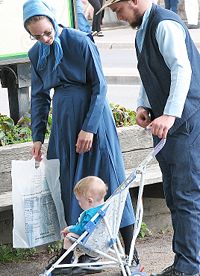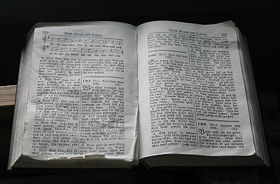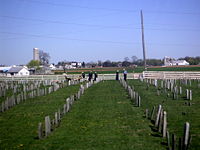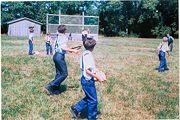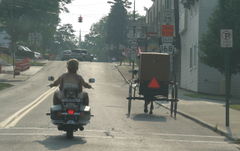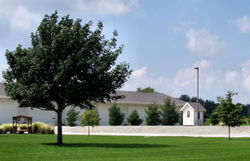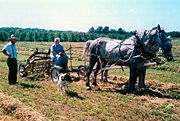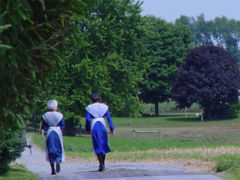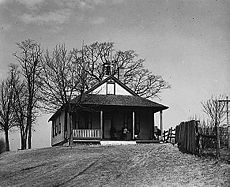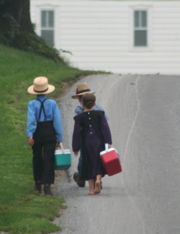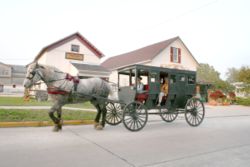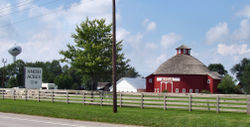Amish
2008/9 Schools Wikipedia Selection. Related subjects: Peoples
| Amish |
|---|
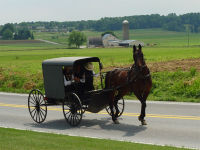 |
| Total population |
|
165,620 |
| Founder |
|
Jakob Ammann |
| Regions with significant populations |
| United States (notably Ohio, Pennsylvania and Indiana) Canada (notably Ontario) |
| Religions |
| Anabaptist |
| Scriptures |
| The Bible |
| Languages |
| Deitsch ("Pennsylvania Dutch"), Alemannic German, English |
The Amish (pronounced /ˈɑːmɪʃ/) are members of an Anabaptist Christian denomination, best known for simple living, plain dress and resisting modern conveniences. The roots of the Amish began in Switzerland among Swiss Brethren in 1693 under the leadership of Jakob Ammann. Then, in the early 18th century they began immigrating to Pennsylvania because of intense persecution. Today, they continue to speak the Pennsylvania German or Alemannic German of their former homeland. Over the years, there have been several divisions among the Amish. The Old Order Amish are those that have been the most successful at resisting change and in retaining their traditional way of life. As of 2000, over 165,000 Old Order Amish live in Canada and the United States. No Amish remain in Europe.
Amish church membership begins with baptism, usually between the ages of 18 and 21. It is a requirment for marriage, and once a person has 'joined church', they must marry within the faith. Church districts average between 20 to 40 families, and worship services are held every other Sunday in a member's home. The district is led by a bishop and several ministers and deacons.
The rules of the church — the Ordnung — must be observed by every member. These rules cover most aspects of day-to-day living, such as no power-line electricity, limiting the use of telephones, prohibition of ownership and operation of an automobile, and specifying the style of dress. Amish do not buy insurance nor accept government assistance, such as Social Security. As Anabaptists, Amish practice nonresistance and will not perform any type of military service. Members who do not conform to these expectations and who cannot be convinced to repent, are excommunicated. In addition to excommunication, members may be shunned — a practice that limits social contacts in order to shame the wayward member into returning to the church. Teenagers who are not baptized are not bound by the rules. They go through a period of rumspringa, or running around, often with a certain amount of misbehavior that would otherwise not be tolerated.
The Amish seek to limit contact with the outside world; instead, they emphasize church and family relationships. They typically operate their own one-room schools, and stop their education at grade eight. They value a rural life, where a large family provides an abundance of manual labor. Because of intermarriage among this relatively small population, higher incidences of certain inheritable diseases occur. Their traditional way of living also makes them an object of tourism, and this has caused many clashes with the modern world.
Population and distribution
The geographic and social isolation of Amish communities make it difficult to determine the total Amish population. In 2000, approximately 165,620 Old Order Amish resided in the United States, of which 73,609 were church members. The Amish are among the fastest-growing populations in the world, with an average of 6.8 children per family. Old Order Amish groups include the Byler group, Nebraska Amish in Mifflin County, Pennsylvania, the Reno group, and the Swartzentruber Amish in Holmes County, Ohio.
There are Old Order communities in 21 states; Pennsylvania has the largest population (44,000), followed by Ohio (43,000) and Indiana (33,000). The largest Amish settlements are in Holmes County, Ohio, Lancaster County, Pennsylvania, and LaGrange, Indiana. Due to rapid population growth within Amish communities, new settlements are constantly being formed to obtain sufficient farmland. Notable Amish communities are located in Kent County, Delaware and Montgomery County, New York. A sizable Old Order community has been increasing in number in St. Lawrence County and Franklin County, New York.
Ethnicity
The Amish are united by a common Swiss- German ancestry, language, and culture, and they marry within the Amish community. The Amish therefore meet the criteria of an ethnic group. However, the Amish themselves generally use the term only to refer to accepted members of their church community, and not as an ethnic designation. Only those who choose to live the plain lifestyle and join the church are considered Amish. Certain Mennonite churches have a high number of people who were formerly from Amish congregations. Although more Amish immigrated to America in the 19th century than during the 18th century, most Amish today descend primarily from 18th century immigrants, because the later immigrants were more liberal. Thus, most of their communities eventually lost their Amish identity.
In some circumstances, Mennonites of Amish descent may still consider themselves Amish, especially in Canada. The former Western Ontario Mennonite Conference (WOMC) was made up almost entirely of former Amish who reunited with the Mennonite Church in Canada. Orland Gingerich's book, The Amish of Canada, devotes the vast majority of its pages not to the Beachy or Old Order Amish, but to congregations in the former WOMC.
History
The Amish descend from the Swiss Anabaptists of the early 16th century Radical Reformation. These Swiss Brethren trace their origination to Felix Manz (ca. 1498–1527) and Conrad Grebel (ca.1498-1526) who broke from reformer Huldrych Zwingli.
The Amish movement takes its name from Jakob Ammann (c. 1656 – c. 1730), a Swiss Brethren leader. Ammann believed Mennonites — peaceful Anabaptists of the Low Countries and Germany — were drifting away from the teachings of Menno Simons and the 1632 Mennonite Dordrecht Confession of Faith. Ammann favored stronger church discipline, including a rigid application of shunning, the social exclusion of excommunicated members. Swiss Anabaptists, who were scattered by persecution throughout Alsace and the Palatinate, never practiced strict shunning as had the lowland Anabaptists. Ammann insisted upon this practice, even to the point of expecting spouses to refuse to eat with each other until the banned spouse repented. This strict literalism brought about a division in the Swiss Brethren in 1693 and led to the establishment of the Amish.
Swiss Anabaptism developed, from this point, in two parallel streams. Those following Ammann became known as Amish. The others eventually adopted the Mennonite name and were the basis of the Swiss Mennonite Conference. Because of this common heritage, Amish and Mennonites retain many similarities. Those who leave the Amish fold tend to join conservative Mennonite congregations.
The Amish began migrating to Pennsylvania in the 18th century as part of a larger migration from the Palatinate and neighboring areas. This migration was a reaction to religious wars, poverty, and religious persecution on the Continent. The first Amish immigrants went to Berks County, Pennsylvania, but later moved, motivated by land issues and by security concerns tied to the French and Indian War. Many eventually settled in Lancaster County, Pennsylvania. Other groups later settled in, or spread to Alabama, Delaware, Illinois, Indiana, Iowa, Kansas, Kentucky, Michigan, Minnesota, Mississippi, Missouri, Nebraska, New York, Ohio, Maryland, Tennessee, Wisconsin, Maine, and Canada.
The Amish congregations left in Europe slowly merged with the Mennonites. The last Amish congregation to merge with the Mennonites was the Ixheim Amish congregation, which merged with the neighboring Mennonite Church in 1937. Some Mennonite congregations, including most in Alsace, are descended directly from former Amish congregations.
Most Amish communities that were established in North America did not ultimately retain their Amish identity. The original major split that resulted in the loss of identity occurred in the 1860s. During that decade Dienerversammlungen (ministerial conferences) were held in Wayne County, Ohio, concerning how the Amish should deal with the pressures of modern society. The meetings themselves were a progressive idea; for bishops to assemble to discuss uniformity was an unprecedented notion in the Amish church. By the first several meetings, the conservative bishops agreed to boycott the conferences. The more progressive members, comprising approximately two thirds of the group, became Amish Mennonite within several decades, and eventually became Mennonite congregations. The traditional group who wanted to preserve the old ways — the Ordnung — became known as the Old Order Amish.
Religious practices
The Old Order Amish do not have church building, but hold worship services in private homes. Thus they are sometimes called "House Amish." This practice is based on a verse from the New Testament: "The God who made the world and all things in it, since He is Lord of heaven and earth, does not dwell in temples made with hands..." (Acts 17:24). In addition, the early Anabaptists, from whom the Amish are descended, were religiously persecuted, and it was safer to pray in the privacy of a home.
Humility
Two key concepts for understanding Amish practices are their rejection of Hochmut (pride, arrogance, haughtiness) and the high value they place on Demut (humility) and Gelassenheit (calmness, composure, placidity) — often translated as "submission" or "letting-be." Gelassenheit is perhaps better understood as a reluctance to be forward, to be self-promoting, or to assert oneself. The Amish willingness to submit to the Will of God, expressed through group norms, is at odds with the individualism so central to the wider American culture. The Amish anti-individualist orientation is the motive for rejecting labor-saving technologies which might make one less dependent on community. Modern innovations like electricity might spark a competition for status goods, or photographs might cultivate personal vanity.
Separation from the world
The Amish consider the Bible a trustworthy guide for living but do not quote it excessively. To do so would be considered a sinful showing of pride. Separation from the rest of society is based on being a "chosen race, a royal priesthood, a holy nation, God’s own people" ( 1 Peter 2:9), not being "conformed to this world" ( Romans 12:2), avoiding "love the world or the things in the world" ( 1 John 2:15) and the belief that "friendship with the world is enmity with God" ( James 4:4).
Both out of concern for the effect of absence from the family life, and in order to minimize contact with outsiders, the Amish prefer to work at home. Increased prices of farmland and decreasing revenues for low-tech farming have forced many Amish to work away from the farm, particularly in construction and manufacturing, and, in those areas where there is a significant tourist trade, to engage in shopwork and crafts for profit. The Amish are ambivalent about both the consequences of this contact and the commoditization of their culture. The decorative arts play little role in authentic Amish life (though the prized Amish quilts are a genuine cultural inheritance, unlike hex signs), and are in fact regarded with suspicion, as a field where egotism and a display of vanity can easily develop.
Amish lifestyles vary between, and sometimes within, communities. These differences range from profound to minuscule. Beachy Amish drive black automobiles, while in some communities various groups differ over the number of suspenders males should wear, if any, or how many pleats there should be in a bonnet, or if one should wear a bonnet at all. Groups with similar policies are held to be "in fellowship" and consider each other members of the same Christian church. Groups in fellowship can intermarry and have communion with one another, an important consideration for avoiding problems that may result from genetically closed populations. Thus minor disagreements within communities, or within districts, over dairy equipment or telephones in workshops can create splinter churches and divide multiple communities.
Some of the strictest Old Order Amish groups are the Nebraska Amish ("White-top" Amish), Troyer Amish, and the Swartzendruber Amish. Nearly all Old Order groups, besides the "Swiss Amish", speak Deitsch in the home, while more progressive Beachy Amish groups often use English in the home. Amish who leave the old ways often remain near their communities. There is a continuum from Old Order Amish to progressive Mennonites.
Shunning
Members who break church rules may be called to confess before the congregation. Those who will not correct their behaviour are excommunicated. Excommunicated members are shunned in order to shame the individual into returning to the church. Members may interact and even help a shunned person, but may not accept anything — like a handshake, payment or automobile ride — directly from the wayward person. Some communities have split in the last century over how they apply the practice of shunning, as in the case of Swartzendruber Amish. This form of discipline is recommended by the bishop after a long process of working with the individual and must be unanimously approved by the congregation. Excommunicated members will be accepted back into the church if they return and confess their wrongdoing.
Religious services
The Old Order Amish have worship services every other Sunday at private homes. The typical district has 80 adults and 90 children under age 19. Worship begins with a short sermon by one of several preachers or the bishop of the church district, followed by scripture reading and silent prayer, and another, longer sermon. The service is interspersed with hymns from the Ausbund, sung without instrumental accompaniment or harmony. Singing is usually very slow, and a single hymn may take 15 minutes to finish. Worship is followed by lunch and socializing. The service and all hymns are in Deitsch. Amish preachers and deacons are selected by lot out of a group of men nominated by the congregation. They serve for life and have no formal training. Amish bishops are similarly chosen by lot from those selected as preachers.
Amish do not work on Sunday, except to care for animals. Use of money or any purchase is forbidden. Drivers may not be hired to bring members to a church service, except in an emergency.
Communion
Generally, the Amish hold communion in the spring and the autumn, and not necessarily during regular church services. Communion is only held open to those who have been baptized. As with regular services, the men and women sit in separate rooms. The ritual ends with members washing and drying each other's feet.
Baptism
The Amish practice of believer's baptism is part of the admission into the church. Amish and other Anabaptists do not believe that a child can be meaningfully baptized. Amish children are expected to follow the will of their parents in all issues, but when they come of age, they must choose to make an adult, permanent commitment to God and the community. Those who come to be baptized sit with one hand over their face, representing humility and submission to the church. Typically, a deacon ladles water from a bucket into the bishop's cupped hands, which drips over the candidate's head. Then the bishop blesses the young men and greets them into the fellowship of the church with a holy kiss. The bishop's wife similarly blesses and greets the young women.
Membership is taken seriously. Those who leave the church are shunned by their congregation and family. Those who choose not to join the church can still relate freely with their friends and family. Church growth happens by having large families and retaining children as part of the community. Old Order Amish do not proselytize, and conversion to the Amish faith is rare but not unheard of.
Weddings
Weddings are typically held on Tuesdays and Thursdays in November to early December, after the harvest is in. The bride wears a new blue linen dress that will be worn again on other formal occasions. She wears no makeup, and will not receive an engagement or wedding ring because the Ordnung prohibits personal jewelry. The marriage ceremony itself may take several hours, followed by a community reception that includes a banquet, singing, and storytelling. Newlyweds spend the wedding night at the home of the bride's parents. Celery is one of the symbolic foods served at Amish weddings. Celery is also placed in vases and used to decorate the house instead of flowers. Rather than immediately taking up housekeeping, the newlywed couple will spend several weekends visiting the homes of friends and relatives who attended the wedding.
Funerals
Funeral customs appear to vary more from community to community than other religious services. In Allen County, Indiana, for example, the Amish engage Hockemeyer Funeral Home, the only local funeral director who offers a horse-drawn hearse and embalms the body. The Amish hold funeral services in the home, however, rather than using the funeral parlor. Instead of referring to the deceased with stories of his life, eulogizing him, services tend to focus on the creation story and biblical accounts of resurrection. After the funeral, the hearse carries the casket to the cemetery for a reading from the Bible; perhaps a hymn is read (rather than sung) and the Lord's Prayer is recited. The Amish usually, but not always, choose Amish cemeteries, and purchase gravestones which are uniform, modest, and plain; in recent years, they have been inscribed in English. The bodies of both men and women are dressed in white clothing by family members of the same sex, women in the white cape and apron of their wedding outfit. After a funeral, the community gathers together to share a meal.
Family Life
Family
Having children, raising them, and socialization with neighbors and relatives are the greatest functions of the Amish family. Amish believe large families are a blessing from God. The main purposes of ‘family’ can be illustrated within the Amish culture in a variety of ways. The family has authority over the individual, not only during infancy and in youth, but throughout life. Loyalties to parents, grandparents, and relatives may change over time, but they will never cease. A church district is measured by the number of families (households), rather than by the number of baptized persons. Families take turns hosting the bi-weekly preaching service. Parents stress their responsibilities and obligations for the correct nurture of their children. They consider themselves accountable to the Lord for the spiritual welfare of their children.
The "family" provides the member with a status within the home and within the community. A person is more of a member of the family, rather than an individual. Each member has a job, a position, a responsibility, and a status. Chores within the home are normally divided by gender. The Amish traditional family provides much of the education for the child. Although the formal education ends after they finish eighth grade, the boy or girl is trained for their adult tasks. The boys will work with the father in the fields, in the barn, and around the out buildings. The girls work inside the home and garden, alongside the mother. The home and family become the school for "on the job" training. Amish youth, by and large, see their parents working hard, and they want to help. They want to learn and to be a productive part of the family.
"Christ is the head of man, and man is the head of woman. One of the greatest needs of our time is men who will assume the responsibility which God has placed on their shoulders. Not to accept that responsibility is to lie down on the job, to fail God’s will." Family Life, Amish monthly magazine.
The elderly do not go to a retirement home, they remain at 'home'. If the house is large enough they continue living with everyone else. Sometimes there is an adjacant dwelling, called the Dawdy Haus, where grandparents take up residence. They continue to help with work on the farm and in the home, as they are able. If they become ill or infirm, then the other members of the family take up the task of caring for them. The aged helped raise the younger members, therefore the younger family care for the them in their old age.
Sports and recreation are shared by all members of the family. There are church outings and family get-togethers where activities are entered into and shared by all.
Rumspringa
Rumspringa (German/Deitsch, "running or jumping around") is the period of adolescence leading up to serious courtship during which rules may be relaxed a little. As in non-Amish families, it is understood as a practical matter that there will likely be a certain amount of misbehavior during this period, but it is neither encouraged nor overlooked. At the end of this period, Amish young adults usually find a spouse and are baptized. A small number choose not to join the church and live the rest of their lives in wider society.
Lifestyle and culture
Amish lifestyle is dictated by the Ordnung (German, meaning: order), which differs slightly from community to community, and, within a community, from district to district. What is acceptable in one community may not be acceptable in another. No summary of Amish lifestyle and culture can be totally adequate, because there are few generalities that are true for all Amish. Groups may separate over matters such as the width of a hat-brim, the colour of buggies, or various other issues. The use of tobacco (excluding cigarettes, which are considered "worldly") and moderate use of alcohol are generally permitted, particularly among older and more conservative groups.
Modern technology
Older Order Amish are known for their avoidance of certain modern technologies. Amish do not view technology as evil, and individuals may petition for acceptance of a particular technology in the local community. In Pennsylvania, bishops meet in the spring and fall to discuss common concerns, including the appropriate response to new technology, and then pass this information on to ministers and deacons in a subsequent meeting. Because of this flat governing structure, variations of practice develop in each community.
High voltage electricity was rejected by 1920 through the actions of a strict bishop, as a reaction against more liberal Amish and to avoid a physical connection to the outside world. Because of the early prohibition of electricity, individual decisions about the use of new inventions such as the television would not be necessary. Electricity is used in some situations when it can be produced without access to outside power lines. Batteries, with their limited applications, are acceptable. Electric generators can be used for welding, recharging batteries, and powering milk stirrers. Outdoor electrical appliances such as riding and hand-pushed lawn mowers and string trimmers are used in some communities. Amish families have non-electric versions of appliances, such as kerosene-powered refrigerators.
Amish communities adopt compromise solutions involving technology that seem strange to outsiders. Gas-powered farm equipment, such as tillers or mowers, may be pushed by a human or pulled by a horse. The reasoning is that Amish farmers will not be tempted to purchase more land in order to out-compete other farmers in their community if they have to move the equipment manually. Amish farmers employ chemical pesticides, chemical fertilizers, and artificial insemination of cows.
The Ordnung is the guide to community standards, rather than doctrine that defines sin. For example, the four Old Order Amish communities of Allen County, Indiana, are more conservative than most; they use open buggies, even during the winter, and they wear black leather shoes even in the hot summer.
Restrictions are not meant to impose suffering. Disabled people are allowed to use motorized wheelchairs; electricity is allowed in the home for medical equipment. Those who break the rules may be given many months to resolve the problem so that they can use a computer to complete a business project or remove electric wiring from a new house.
Although most Amish will not drive cars, they will hire drivers and vans, for example, for visiting family, monthly grocery shopping, or commuting to the workplace off the farm — though this too is subject to local regulation and variation. The practice increases the geographic reach of the Amish, and decreases isolation: a horse can travel only about 25 miles (40 km), and then it must rest for a considerable period, restricting the Amish to a radius of 12.5 miles (20.1 km) from home. Moreover, a horse and buggy can only sustain 10 mph (16 km/h) over an extended distance, and thus is impractical for emergencies. Regular bus service between Amish communities has been established in some areas, and train travel is accepted.
The avoidance of telephone technology is also misunderstood. The Amish dislike the telephone because it interferes with their separation from the world. By bringing the outside world into the home, it is an intrusion into the privacy and sanctity of the family, and interferes with social community by eliminating face-to-face communication. Amish of Lancaster County use the telephone primarily for outgoing calls, with the added restriction that the telephone not be inside the house, but rather in a phone "booth" or small out-building placed far enough from the house as to make its use inconvenient. These private phones may be shared by more than one family. This allows the Amish to control their communication, and not have telephone calls invade their homes, but also to conduct business, as needed. In the past, the use of public pay phones in town for such calls was more common; today, with dwindling availability of pay phones because of increased cell phone use by the non-Amish population, Amish communities are seeing an increase in the private phone shanties. Many Amish, particularly those who run businesses, use voicemail service. The Amish will also use trusted "English" neighbors as contact points for passing on family emergency messages. Some New Order Amish will use cellphones and pagers, but most Old Order Amish will not.
Language
In addition to English, most Amish speak a distinctive German dialect called Pennsylvania German or Pennsylvania Dutch, which they call Deitsch ("German"). Pennsylvania German is derived from Palatinate German of the eighteenth century along with words borrowed from English. The English term "Dutch" originally referred to all forms of the German language, whose own name for itself is Deutsch. Deitsch is distinct from Plautdietsch and Hutterite German dialects spoken by other Anabaptist groups.
Now limited primarily to the Amish and Old Order Mennonites, Pennsylvania German was originally spoken by many German-American immigrants in Pennsylvania, especially those who came prior to 1800. The so-called Swiss Amish speak an Alemannic German dialect that they call "Swiss." Beachy Amish, especially those who were born roughly after 1960, tend to speak predominantly in English at home. All other Amish groups use either Pennsylvania German or "Swiss" German as their in-group language of discourse. There are small dialectal variations between communities, such as Lancaster County and Indiana speech varieties. The Amish are aware of regional variation, and occasionally experience difficulty in understanding speakers from outside their own area.
Clothing
Hook-and-eye closures or straight pins are used as fasteners on dress clothing. Snaps are used on everyday clothes, and buttons for work shirts and trousers. The historic restriction on buttons is attributed to tradition and their potential for ostentation. In all things, the aesthetic value is plainness: clothing should not call attention to the wearer by cut, colour, or any other feature. Prints such as florals, stripes and polka-dots are not allowed in Amish dress.
Women wear calf-length plain-cut dresses in a solid colour, such as blue. Aprons are often worn at home, usually in white or black, and are always worn when attending church. A cape, which consists of a triangular piece of cloth, is usually worn, beginning around the teenage years, and pinned into the apron. In the colder months, a long woolen cloak is worn. Heavy bonnets are worn over the prayer coverings when Amish women are out and about in cold weather, with the exception of the Nebraska Amish, who do not wear bonnets. Girls wear colored bonnets until age nine; older girls and women wear black bonnets. Girls begin wearing a cape for church and dress up occasions at about age eight. Single women wear a white cape to church until about the age of thirty. Everyday capes are colored, matching the dress, until about age forty when only black is used.
Men typically wear dark-colored trousers and a dark vest or coat, suspenders, broad-rimmed straw hats in the warmer months, and black felt hats in the colder months. Married men and those over forty grow a beard. Moustaches are not allowed, because they are associated with European military officers. A beard serves the same symbolic function as a wedding ring and marks the passage into manhood.
During the summer months, the majority of Amish children go barefoot, including to school. The prevalence of the practice is attested in the Pennsylvania Deitsch saying, "Deel Leit laafe baarfiessich rum un die annre hen ken Schuh." ("Some people walk around barefooted, and the rest have no shoes.") The amount of time spent barefoot varies, but most children and adults go barefoot whenever possible.
Health
Amish populations have higher incidences of particular genetic disorders, including dwarfism ( Ellis-van Creveld syndrome), various metabolic disorders, and unusual distribution of blood-types. Amish represent a collection of different demes or genetically-closed communities. Since almost all Amish descend from about 200 18th century founders, genetic disorders from inbreeding exist in more isolated districts. Some of these disorders are quite rare, or unique, and are serious enough to increase the mortality rate among Amish children. The majority of Amish accept these as "Gottes Wille" (God's will); they reject use of preventive genetic tests prior to marriage and genetic testing of unborn children to discover genetic disorder. Amish are willing to participate in studies of genetics diseases. Their extensive family histories are useful to researchers investigating diseases such as Alzheimer's, Parkinson's, and macular degeneration.
Amish are conscious of the advantages of exogamy. A common bloodline in one community will often be absent in another, and genetic disorders can be avoided by choosing spouses from unrelated communities. For example, the founding families of the Lancaster County Amish are unrelated to the founders of the Perth County, Ontario Amish community.
Amish do not carry private commercial health insurance. About two-thirds of the Amish in Lancaster County participate in Church Aid, an informal self-insurance plan for helping members with catastrophic medical expenses. A handful of American hospitals, starting in the mid-1990s, created special outreach programs to assist the Amish. The first of these programs was instituted at the Susquehanna Health System in central Pennsylvania by James Huebert. This program has earned national media attention in the United States, and has spread to several surrounding hospitals. Treating genetic problems is the mission of Clinic for Special Children in Strasburg, Pennsylvania, which has developed effective treatments for such problems as maple syrup urine disease, a previously fatal disease. The clinic is embraced by most Amish, ending the need for parents to leave the community to receive proper care for their children, an action that might result in shunning.
DDC Clinic for Special Needs Children, located in Middlefield, Ohio, has been treating special-needs children with inherited or metabolic disorders since May 2002. The DDC Clinic provides treatment, research, and educational services to Amish and non-Amish children and their families.
Although not forbidden or thought of as immoral, most Amish do not practice any form of birth control, hence their large families. They are against abortion and also find "artificial insemination, genetics, eugenics, and stem cell research" to be "inconsistent with Amish values and beliefs".
People's Helpers is an Amish-organized network of mental health caregivers who help families dealing with mental illness and recommend professional counselors. Suicide rates for the Amish of Lancaster County were 5.5 per 100,000 in 1980, about half that of the general population and a third the rate of the non-religious population.
Education
The Amish do not educate their children past the eighth grade, believing that the basic knowledge offered up to that point is sufficient to prepare one for the Amish lifestyle. Almost no Amish go to high school, much less to college. In many communities, the Amish operate their own schools, which are typically one-room schoolhouses with teachers (young unmarried women) from the Amish community. These schools provide education in many crafts, and are therefore eligible as vocational education, fulfilling the nationwide requirement of education through the 10th grade or its equivalent. There are Amish children who go to non-Amish public schools, even schools that are far away and that include a very small Amish population. For instance, there have been some Amish children who have attended Leesburg Elementary School in Leesburg, Indiana (about 12 miles (19 km) from Nappanee, Indiana), because their families lived on the edge of the school district. In the past, there have been major conflicts between the Amish and outsiders over these matters of local schooling. But for the most part, they have been resolved, and the educational authorities allow the Amish to educate their children in their own ways. Sometimes, there are conflicts between the state-mandated minimum age for discontinuing schooling, and the younger age of children who have completed the eighth grade. This is often handled by having the children repeat the eighth grade until they are old enough to leave school. However, in the past, when comparing standardized test scores of Amish students, the Amish have performed above the national average for rural public school pupils in spelling, word usage, and arithmetic. They performed below the national average, however, in vocabulary.
On May 19, 1972, Jonas Yoder and Wallace Miller of the Old Order Amish, and Adin Yutzy of the Conservative Amish Mennonite Church, were each fined $5 for refusing to send their children, aged 14 and 15, to high school. In Wisconsin v. Yoder, the Wisconsin Supreme Court overturned the conviction, and the U.S. Supreme Court affirmed this, finding that the benefits of universal education do not justify a violation of the Free Exercise Clause of the First Amendment.
The decision of the U.S. Supreme Court quoted sociology professor John A. Hostetler (1918–2001), who was born into an Amish family, wrote several books about the Amish, Hutterites, and Old Order Mennonites, and was then considered the foremost academic authority on the Amish. Donald Kraybill, Distinguished College Professor and Senior Fellow in the Young Centre for Anabaptist and Pietist Studies at Elizabethtown College, is one of the most active scholars studying the Amish today.
Relations with the outside world
The Amish feel the pressures of the modern world. Child labor laws, for example, are seriously threatening their long-established ways of life. Amish children are taught at an early age to work hard. Parents will supervise the children in new tasks, to ensure that they learn to do them effectively and safely. The modern child labor laws conflict with allowing the Amish parents to decide whether their children are competent to perform hazardous tasks.
Contrary to popular belief, some of the Amish vote, and they have been courted by national parties as potentially swing voters: their pacifism and social conscience cause some of them to be drawn to left-of-center politics, while their generally conservative outlook causes others to favour the right wing.
They are nonresistant, and rarely defend themselves physically or even in court; in wartime, they take conscientious objector status. Their own folk-history contains tales of heroic nonresistance, such as the insistence of Jacob Hochstetler (1704-1775) that his sons stop shooting at hostile Indians, who proceeded to kill some of the family and take others captive. During World War I two young men held at Fort Leavenworth, known for its brutality against conscientious objectors, refused to wear prison uniforms because of the buttons. They were tortured by the guards — held under cold showers until completely chilled, knocked down to the cement floor and dragged by their hair and ears — until they relented and put on the uniforms. During World War II the Amish entered Civilian Public Service.
Amish rely on their church and community for support, and thus reject the concept of insurance. An example of such support is barn raising, in which the entire community gathers together to build a barn in a single day. It means coming together to celebrate with family and friends.
In 1961, the United States Internal Revenue Service announced that since the Amish refuse Social Security benefits and have a religious objection to insurance, they need not pay these taxes. In 1965, this policy was codified into law. Self-employed individuals in certain sects do not pay into, nor receive benefits from, United States Social Security, nor do their similarly-exempt employees. Internal Revenue Service form 4029 grants this exemption to members of a religous group that is conscientiously opposed to accepting benefits of any private or public insurance, provides a reasonable level of living for its dependent members and has existed continuously since December 31, 1950. A visible sign of the care Amish provide for the elderly is the smaller Grossdaadi Heiser or Daadiheiser ("grandfather house"), often built near the main dwelling. Amish employees of non-Amish employers are taxed, but they do not apply for benefits. Aside from Social Security and workers' compensation, American Amish pay all required taxes.
The Amish have, on occasion, encountered discrimination and hostility from their neighbors. During the two 20th century World Wars, Amish nonresistance sparked many incidents of harassment, and young Amish men forcibly inducted into the services were subjected to various forms of ill treatment. In the present day, anti-Amish sentiment has taken the form of pelting the horse-drawn carriages used by the Amish with stones or similar objects as the carriages pass along a road, most commonly at night. A 1988, made-for-TV film, A Stoning In Fulham County, is based on a true story involving one such incident, in which a six-month-old Amish girl was struck in the head by a rock and died from her injuries. In 1997, Mary Kuepfer, a young Amish woman in Milverton, Ontario, Canada, was struck in the face by a beer bottle believed to have been thrown from a passing car; she required thousands of dollars' worth of surgery to her face (which was paid for by an outpouring of donations from the public).
Portrayal in popular entertainment
Film
Peter Weir's 1985 acclaimed drama Witness is set and filmed in the Amish community of Lancaster County, Pennsylvania. The story focuses on the interaction and culture clash of an Amish family with a Philadelphia detective ( Harrison Ford) hiding among them while he investigates a murder that an Amish boy witnessed. The film won an Oscar for screenwriting, and it was nominated for several other Academy Awards. Harvest of Fire is a 1996 Hallmark Hall of Fame made-for-TV movie about an FBI agent's investigation of cases of suspected arson in an Amish farming community, and the relationship she develops with an Amish woman who helps her to uncover the truth. The 2002 documentary Devil's Playground follows a group of Amish teenagers during rumspringa, and it portrays their personal dilemma with both the 'English' world and the decision on whether or not to be baptized as adult members of the church.
Some comic movie portrayals of the Amish include Randy Quaid’s Amish character "Ishmael Boorg" in Kingpin, directed by the Farrelly brothers in 1996, and the 1997 For Richer or Poorer, starring Tim Allen and Kirstie Alley, also about city folk hiding among the Amish. Rob Reiner's 1994 comedy, North, includes a short vignette sequel to Witness, with two of the original actors, Kelly McGillis and Alexander Godunov, portraying what might have happened to their characters after the end of Witness. The 1968 comedy The Night They Raided Minsky's is the story of an Amish girl who goes to New York in the 1920s to be a dancer, and ends up as a burlesque stripper.
Literature
Modern novels
Paul Levinson's 1999 Locus Award-winning novel, The Silk Code portrays Amish farmers involved in a science-fiction mystery about biotechnology and mysterious deaths. Jodi Picoult's 2000 novel (and 2004 TV movie) Plain Truth, deals with a crime concerning the death of a newborn infant on an Amish farm. Other novels dealing with the Amish are Lurlene McDaniel's 2002 The Angels Trilogy, and Beverly Lewis' extensive series of Amish romantic fiction.
Older novels
Helen Reimensnyder Martin's 1905 novel Sabina, a Story of the Amish, similar to her 1904 novel Tillie, a Mennonite Maid, so harshly depicted its subjects as to provoke cries of misrepresentation. Anna Balmer Myers' 1920 novel Patchwork; a Story of "the Plain People," like her 1921 novel Amanda: A Daughter of the Mennonites, are generally regarded as gentle correctives to the work of Martin. Ruth Lininger Dobson's 1937 novel Straw in the Wind, written while a student at the University of Michigan and receiving the school's Hopwood Award, so negatively depicted the Amish of Indiana that Joseph Yoder was motivated to correct the severe stereotypes with a more accurate book about the Amish way of life. In 1940, he wrote the gentler Rosanna of the Amish, a story of his mother's life (and his own). He later wrote a sequel, Rosanna's Boys (1948), as well as other books presenting and recording what he regarded as a truer picture of Amish culture.
Children's literature
Marguerite de Angeli's 1936 children's story Henner's Lydia portrays a tender Amish family. The author sketched many of the illustrations at the site of the little red schoolhouse still standing at the intersection of PA route 23 and Red Schoolhouse Road, just west of Morgantown, Pennsylvania. Today the building is the Amish Mennonite Information Centre. The Lancaster County landscape, portrayed in the end papers of the book, can be recognized throughout the area. De Angeli's illustrations of a nearby bank barn were sketched just hours before the barn was destroyed by fire. She incorporated the incident in her 1944 Caldecott Honour book Yonie Wondernose, a story about a curious Amish boy, younger brother to the Lydia of Henner's Lydia.
Theatre
The 1955 Broadway musical show, Plain and Fancy, is an early stage-play portrayal of the Amish people. Set in Lancaster County, it tells of a couple from New York who encounter the quaint Amish lifestyle when they arrive to sell off some property. This show depicted "shunning" and "barn-raising" to the American audience for the first time. Another play featuring the Amish is Quiet in the Lands, a Canadian play concerning Amish struggles during World War II.
Television
NBC aired, in 1988, a family drama called Aaron's Way about an Amish family who moved to California and had to adjust to a non-Amish lifestyle. Numerous other TV shows have presented episodes with Amish characters or storylines. Some of them include Pinky and the Brain, Arthur (TV series), Picket Fences, Murder She Wrote, MacGyver, Grey's Anatomy, Tales of the Gold Monkey, and Cold Case. In the summer of 2004, a controversial reality-television program called Amish in the City aired on UPN. Amish teenagers were exposed to non-Amish culture by living together with "English" teens, and at the time of the show, had yet to decide if they wanted to be baptized into the Amish church. The conduct of the teenagers involved would not be condoned by the majority of the Old Order Amish. A similar miniseries called The Outsiders was broadcast by ABC in 2008. On October 7, 2007, the CBS television show Cold Case featured an episode titled "Running Around," in which the team re-opened the 2006 case of a missing Amish girl murdered during her rumspringa journey to Philadelphia.
Music
"Weird Al" Yankovic's 1996 parody Amish Paradise and the accompanying music video was an affectionate send-up of Coolio's earlier hip-hop song Gangsta's Paradise, with Yankovic in Amish garb, and lyrics reflecting Amish themes.
Similar groups
Sometimes outsiders consider other Anabaptists, such as the Old Order Mennonites, Hutterites, and Old German Baptist Brethren, who also avoid automobiles while living separate, to be the same as the Old Order Amish. However, each group is distinct. They all emigrated from Europe, but they arrived with different dialects, separate cultures, and diverse religious traditions.
Particularly, the Hutterites live communally and do not have the same roots as other Anabaptists. Instead, they use modern farming methods, including extended and crew-cab pickup trucks for personal transportation.
Plain Quakers are similar in manner and lifestyle, but unrelated to the Amish. Early Quakers were influenced, to some degree, by the Anabaptists. Most modern Quakers have since abandoned their traditional dress.
